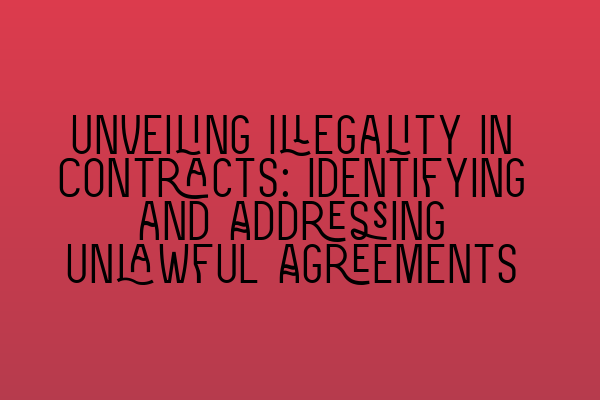Unveiling Illegality in Contracts: Identifying and Addressing Unlawful Agreements
Welcome to SQE Contract Law, where we provide expert legal advice and insights to help you navigate the complex world of contracts. In this blog post, we will delve into the topic of illegality in contracts, uncovering the various forms it can take and exploring strategies for addressing unlawful agreements.
Contracts are the backbone of commercial transactions and civil relationships, providing a framework for parties to establish their rights, obligations, and responsibilities. However, not all contracts are enforceable under the law. Illegality in contracts refers to situations where the subject matter or purpose of the agreement violates statutes, public policy, or common law principles.
The Forms of Illegality
Illegality can manifest in contracts in several ways, and it is crucial to identify and address these issues to avoid legal consequences. Let’s explore some common forms:
- Statutory Illegality: Certain activities or transactions may be explicitly prohibited by legislation. For example, contracts related to illegal drugs, gambling, or human trafficking are considered void and unenforceable. It is essential to familiarize yourself with relevant laws and regulations to ensure compliance.
- Public Policy Illegality: Contracts that contravene public policy principles are deemed invalid. Public policy encompasses societal values and interests that the law seeks to protect. Examples of contracts against public policy include those promoting fraud, encouraging discrimination, or undermining public safety.
- Restraint of Trade: Contracts that impose unreasonable restraints on trade or competition may be unenforceable. These restraints can include non-compete clauses, exclusivity agreements, or provisions that seek to stifle free market competition. However, reasonable restrictions to protect legitimate business interests may be permissible.
Identifying Illegality
Identifying illegality in contracts requires a careful analysis of the specific circumstances and the relevant legal framework. Here are some steps to help you identify potential issues:
- Review the Contract: Thoroughly examine the terms and conditions of the contract to identify any clauses or provisions that may raise legality concerns. Pay attention to the subject matter, the intent of the parties, and any provisions that may conflict with applicable laws.
- Research Applicable Laws: Conduct comprehensive research to understand the relevant laws and regulations in the specific jurisdiction where the contract is being executed. Consult legal resources, precedents, and seek professional advice to gain a deeper understanding of the legal landscape.
- Evaluate Public Policy Implications: Consider the broader societal impact of the contract’s subject matter or purpose. Assess whether the agreement promotes or undermines public policy objectives and determine if any legal barriers may arise due to public policy considerations.
- Seek Legal Advice: If you are uncertain about the legality of a contract, it is prudent to consult with a qualified solicitor who specializes in contract law. They can provide you with expert guidance and help you navigate the complexities of the legal system.
Addressing Illegality
When encountering an illegal contract, there are various strategies to address the issue effectively:
- Seek Rescission: Rescission refers to the cancellation of the contract. If both parties involved are in agreement, they may choose to cancel the contract voluntarily. However, seeking legal advice is crucial to ensure the appropriate steps are taken.
- Apply for a Court Order: In cases where the parties do not agree on rescission or where one party refuses to cooperate, it may be necessary to apply for a court order declaring the contract void or unenforceable. A solicitor can guide you through the court process and present your case effectively.
- Consider Severability: In some instances, only a portion of a contract may be deemed illegal, while the remaining parts remain valid. It is important to assess whether the illegal clause can be severed from the contract, allowing the rest of the agreement to remain enforceable.
Conclusion
Unveiling illegality in contracts is essential for ensuring compliance with the law and protecting your rights and interests. By identifying and addressing unlawful agreements through thorough analysis, legal research, and expert guidance, you can mitigate potential legal risks and safeguard your business or personal dealings.
At SQE Contract Law, our team of experienced solicitors is here to assist you with all your contract law needs. For more information on legal challenges, pitfalls, and best practices, be sure to check out our related articles:
- Navigating Legal Challenges and Pitfalls in Your Practice
- Barrister vs. Solicitor: A Comprehensive Comparison
- Understanding the SRA Competence Statement: A Guide for Solicitors
- Exploring Different Solicitor Specializations: Finding Your Niche
- Top Recommendations for Law Schools in the UK
If you require assistance or have further inquiries, please do not hesitate to contact us. Our team is ready to provide you with personalized legal solutions tailored to your unique circumstances. Trust SQE Contract Law to handle your contract law matters with professionalism, expertise, and dedication.
